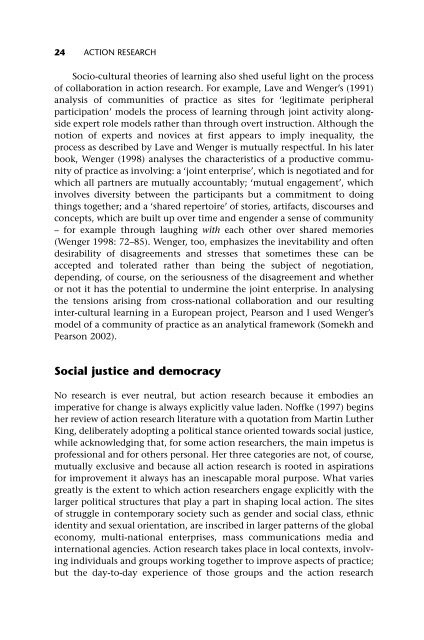Action Research A Methodology for Change and Development
Action Research A Methodology for Change and Development
Action Research A Methodology for Change and Development
You also want an ePaper? Increase the reach of your titles
YUMPU automatically turns print PDFs into web optimized ePapers that Google loves.
24 ACTION RESEARCH<br />
Socio-cultural theories of learning also shed useful light on the process<br />
of collaboration in action research. For example, Lave <strong>and</strong> Wenger’s (1991)<br />
analysis of communities of practice as sites <strong>for</strong> ‘legitimate peripheral<br />
participation’ models the process of learning through joint activity alongside<br />
expert role models rather than through overt instruction. Although the<br />
notion of experts <strong>and</strong> novices at first appears to imply inequality, the<br />
process as described by Lave <strong>and</strong> Wenger is mutually respectful. In his later<br />
book, Wenger (1998) analyses the characteristics of a productive community<br />
of practice as involving: a ‘joint enterprise’, which is negotiated <strong>and</strong> <strong>for</strong><br />
which all partners are mutually accountably; ‘mutual engagement’, which<br />
involves diversity between the participants but a commitment to doing<br />
things together; <strong>and</strong> a ‘shared repertoire’ of stories, artifacts, discourses <strong>and</strong><br />
concepts, which are built up over time <strong>and</strong> engender a sense of community<br />
– <strong>for</strong> example through laughing with each other over shared memories<br />
(Wenger 1998: 72–85). Wenger, too, emphasizes the inevitability <strong>and</strong> often<br />
desirability of disagreements <strong>and</strong> stresses that sometimes these can be<br />
accepted <strong>and</strong> tolerated rather than being the subject of negotiation,<br />
depending, of course, on the seriousness of the disagreement <strong>and</strong> whether<br />
or not it has the potential to undermine the joint enterprise. In analysing<br />
the tensions arising from cross-national collaboration <strong>and</strong> our resulting<br />
inter-cultural learning in a European project, Pearson <strong>and</strong> I used Wenger’s<br />
model of a community of practice as an analytical framework (Somekh <strong>and</strong><br />
Pearson 2002).<br />
Social justice <strong>and</strong> democracy<br />
No research is ever neutral, but action research because it embodies an<br />
imperative <strong>for</strong> change is always explicitly value laden. Noffke (1997) begins<br />
her review of action research literature with a quotation from Martin Luther<br />
King, deliberately adopting a political stance oriented towards social justice,<br />
while acknowledging that, <strong>for</strong> some action researchers, the main impetus is<br />
professional <strong>and</strong> <strong>for</strong> others personal. Her three categories are not, of course,<br />
mutually exclusive <strong>and</strong> because all action research is rooted in aspirations<br />
<strong>for</strong> improvement it always has an inescapable moral purpose. What varies<br />
greatly is the extent to which action researchers engage explicitly with the<br />
larger political structures that play a part in shaping local action. The sites<br />
of struggle in contemporary society such as gender <strong>and</strong> social class, ethnic<br />
identity <strong>and</strong> sexual orientation, are inscribed in larger patterns of the global<br />
economy, multi-national enterprises, mass communications media <strong>and</strong><br />
international agencies. <strong>Action</strong> research takes place in local contexts, involving<br />
individuals <strong>and</strong> groups working together to improve aspects of practice;<br />
but the day-to-day experience of those groups <strong>and</strong> the action research

















